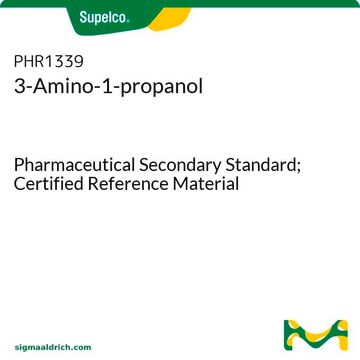PHR1578
Triéthanolamine
Pharmaceutical Secondary Standard; Certified Reference Material
Synonyme(s) :
2,2′,2′′-nitrilotriéthanol, Tris(2-hydroxyéthyl)amine
About This Item
Produits recommandés
Qualité
certified reference material
pharmaceutical secondary standard
Niveau de qualité
Agence
traceable to Ph. Eur. T2545000
traceable to USP 1696958
Densité de vapeur
5.14 (vs air)
Pression de vapeur
0.01 mmHg ( 20 °C)
Famille d'API
trolamine
CofA (certificat d'analyse)
current certificate can be downloaded
Température d'inflammation spontanée
600 °F
Limite d'explosivité
8.5 %
Conditionnement
ampule of 5 mL
Technique(s)
HPLC: suitable
gas chromatography (GC): suitable
Indice de réfraction
n20/D 1.485 (lit.)
Plage de pH utile
7.3-8.3
pKa (25 °C)
7.8
Point d'ébullition
190-193 °C/5 mmHg (lit.)
Pf
17.9-21 °C (lit.)
Densité
1.124 g/mL at 25 °C (lit.)
Application(s)
pharmaceutical (small molecule)
Format
neat
Température de stockage
2-30°C
Chaîne SMILES
OCCN(CCO)CCO
InChI
1S/C6H15NO3/c8-4-1-7(2-5-9)3-6-10/h8-10H,1-6H2
Clé InChI
GSEJCLTVZPLZKY-UHFFFAOYSA-N
Vous recherchez des produits similaires ? Visite Guide de comparaison des produits
Description générale
Application
Remarque sur l'analyse
Autres remarques
Note de bas de page
Produits recommandés
Code de la classe de stockage
10 - Combustible liquids
Classe de danger pour l'eau (WGK)
WGK 1
Point d'éclair (°F)
354.2 °F - closed cup
Point d'éclair (°C)
179 °C - closed cup
Faites votre choix parmi les versions les plus récentes :
Déjà en possession de ce produit ?
Retrouvez la documentation relative aux produits que vous avez récemment achetés dans la Bibliothèque de documents.
Les clients ont également consulté
Notre équipe de scientifiques dispose d'une expérience dans tous les secteurs de la recherche, notamment en sciences de la vie, science des matériaux, synthèse chimique, chromatographie, analyse et dans de nombreux autres domaines..
Contacter notre Service technique






